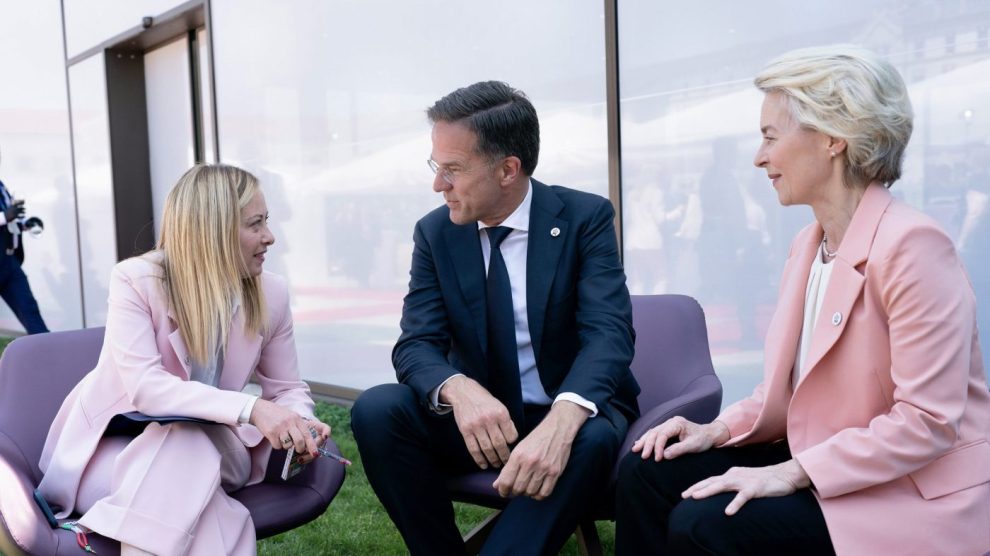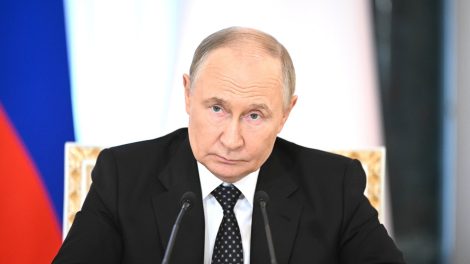Tunis-bound European leaders. On Sunday, EU Commission President Ursula von der Leyen is slated to reach the Tunisian capital with the Dutch and Italian Prime Ministers Mark Rutte and Giorgia Meloni. The trio’s mission is geared at encouraging reforms to trigger a $2 billion bailout from the International Monetary Fund, which the country urgently needs to address its deep economic crisis.
- They will meet with Tunisian President Kaïs Saïed, with the issues of migration and economic and energy cooperation topping the agenda, the EU Commission said.
An Italy-led dialogue. PM Meloni was in Tunis just this past Tuesday, spearheading efforts to adopt a “pragmatic” line on the stalled IMF financing to avoid Tunisia defaulting on its own debt and aggravating the already-ballooning wave of migrants who depart from the country’s coasts attempting to reach the EU via Italian shores. President Saïed is resisting the reforms, calling them “diktats,” as he fears the social backlash that could ensue.
- The EU Commission acknowledged the existence of a “constructive dialogue” between Tunis and Rome. The trip does not imply the existence of an agreement with Tunisia, specified Commission Spokesperson Eric Mamer, but “there will be a discussion on the various aspects” of relations and cooperation between the EU and Tunis.”
Meanwhile, EU Council agrees on new migratory framework. The trip to Tunis is happening at a crucial juncture in the EU, as the bloc’s interior ministers reached on Tuesday night a “historic” migration deal – intended to replace the obsolete Dublin Agreements and ensure that all member States contribute to addressing one of the EU’s most complex issues.
- “I didn’t really believe I would be sitting here saying this… but we have adopted general approaches on the asylum and migration management regulation and asylum procedure regulation,” announced Swedish Immigration Minister Malmer Stenergard on Thursday evening.
- “Today is a day where something is beginning. We are not arriving; we are setting off,” said Italy’s Interior Minister Matteo Piantedosi, who had been pushing for a hybrid solution.
The nitty-gritty. The key point of the new deal entails EU states either accepting migrants or paying €20,000 for each migrant they refuse to host. The money will go into a special Commission-managed fund to finance development projects in countries of origin to address the root causes of the migrants’ decision to emigrate.
- The financial contribution replaced the idea of mandatory relocation from frontline countries – such as Greece and Italy – which several States refused.
- The deal must now pass through the European Parliament, where some MEPs are still resisting this sort of agreement and pushing for mandatory relocation.
- Hungary and Poland rejected the agreement, although the numbers allow for a comfortable qualified majority – which is what this deal requires to pass.
Pairing migration management with investments. The EU Council’s solution shows clear marks of Rome’s influence. Ever since Ms Meloni became PM in September 2022, her government has been intensifying Italian efforts to curb illegal departures while providing material support, as well as a plethora of investment deals, with African countries.
- That’s the PM’s recipe for addressing the migration issue, a core objective of her mandate, and the basic idea behind the upcoming, energy-heavy Mattei Plan (set to be presented in October).




